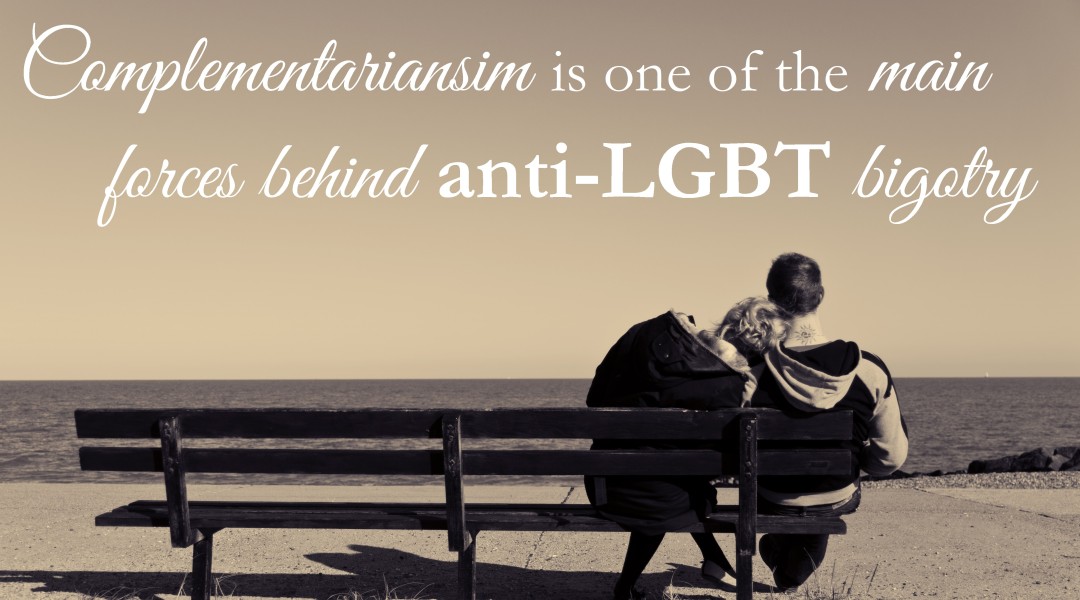As I’ve become more involved in the LGBT community, especially as I’ve been forming relationships and connections with affirming Christians who want to see the American church live up to Jesus’ principle that they will know us by our love, I keep running across an idea that I think is a problem. We see it in Matthew Vines’ book God and the Gay Christian, and I saw it earlier this week in a blog post by Kathy Burdock, who wrote Walking the Bridgeless Canyon.
It looks like this in Matthew’s book:
I want you to notice the close link between Philo’s views on same-sex relations and his beliefs about women. Philo called the passive male partner in same-sex relations a “man-woman counterfeiting the coin of nature.” He condemned the active partner as well, on grounds that would offend both affirming and non-affirming Christians today. Philo said the active partner was “a guide and teacher of the greatest evils, unmanliness and effeminacy.” …
Yes, the clear denigration of women is offensive. (90-91)
And like this in Kathy’s post:
The perception and cultural response to same-sex behavior between males has intractable roots in the social and sexual status of women throughout history. Because same-sex acts placed one male in the submissive, penetrated role of a woman, one male was invariably looked upon as if he were a woman …
As women rose in status, as cities formed, and as men began to explore sexual attractions, the interaction, which had always been associated with excess, lust and the reduction of one partner to the role of a woman, came to be seen differently.
I agree with the essentials of these arguments, and I think it’s extremely important to draw attention to the reasons why ancient writers condemned sex between two men. People like Philo and Plutarch and Clement wrote against gay sex because they were deeply misogynistic and femmephobic.
However, I think Matthew and Kathy made a mistake in presenting the argument this way, because their opposition– in this context, those who argue against marriage equality based on “gender complementarity”– does not agree with this premise. They argue these things from the viewpoint that ‘we can basically all agree’ that these horrifically misogynistic attitudes are “clearly offensive” or that women’s roles are “seen differently now.”
They’re not. Not in complementarianism.
For ease of discussion, I am not referring to a style of complementarianism practiced by many Christians, what I and John Piper call “functional egalitarianism”: those who live out equality in their marriages, but with a dash of gender essentialism thrown in. I am instead working with the definition laid out in the Danvers Statement— that men and women are relegated to specific roles, and that the man’s role is defined by leadership and decision-making, while the woman’s role is defined by submission.
When it comes to sex, Douglas Wilson lays these roles out in stark terms:
In other words, however we try, the sexual act cannot be made into an egalitarian pleasuring party. A man penetrates, conquers, colonizes, plants. A woman receives, surrenders, accepts. This is of course offensive to all egalitarians, and so our culture has rebelled against the concept of authority and submission in marriage. This means that we have sought to suppress the concepts of authority and submission as they relate to the marriage bed …
True authority and true submission are therefore an erotic necessity.
This position was hailed and supported on The Gospel Coalition website, and I believe is fully supported by complementarian theology. To those who support complementarianism, a woman’s role even in sex has not budged an inch from the time of Paul and Clement. The woman is to be “conquered,” and she is required to accept this as her only biblically-supported role.
This is why I believe Christian feminism is of central necessity to the LGBT community and to the dialog with non-affirming Christians and churches. Without feminist theology, without people arguing against misogynistic interpretations of Scripture, affirming allies and queer Christians are going to be left spinning their wheels in the mud. The argument that biblical writers condemned gay sex not because of anything inherent to gay sex but because of misogyny isn’t going to get anywhere as long as so many conservatives are running around believing that misogynistic views of women and marriage are biblical.
We can’t afford to assume that anti-LGBT theologians agree with us on this. The second they encounter people like Matthew or Kathy saying that the submissive role for women is “clearly offensive” they’re going to roll their eyes and stop listening, because complementarianism is the only construct they have for understanding male-female relationships. Not only that, but they’ll be comfortable dismissing affirming arguments as unbiblical. In order to persuade anti-LGBT Christians, we have to address their assumptions (like heteronormativity), not just the arguments surrounding a mere six passages of Scripture.







